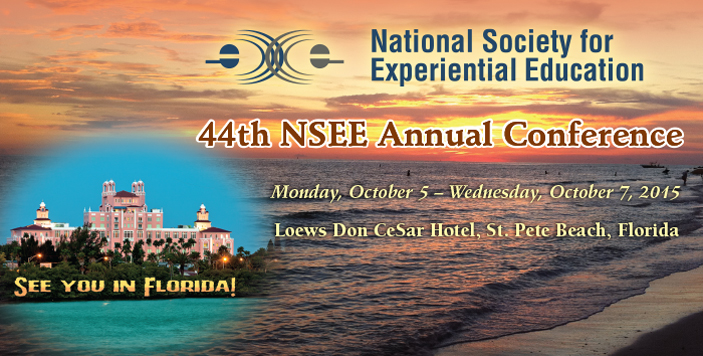 |
 |
 |
|
44th Annual Conference
Call for Proposals - Extended Deadline: February 4, 2015
Teaching and learning today take place in a fast-paced and ever-changing landscape of technology, information, social media and global connectivity. The many forms of experiential education—internships, service learning, education abroad, co-ops, project work, or undergraduate research—are no exception. Embedding high-impact teaching practices into our educational programs and providing students with concrete and authentic learning experiences in which they can reflect, conceptualize, and actively experiment—these are the challenges we face in a digital world where students spend ever more time and energy within virtual spaces, online platforms and social networks. Whether carried out across the oceans or across the tracks, today’s experiential education programs—if they are to be effective and lead to meaningful learning and personal development—must respond to the many challenges and very great opportunities that a wireless and often virtual world of connectivity and information present to experiential teachers and learners. As educators in this new world informational order, we face a singular challenge: how best to preserve the high-impact experiential teaching and learning practices that we know work and which research continues to demonstrate. The opportunity before us—how to integrate these new technologies into established high-impact practices intelligently, authentically, and reflectively—holds out the promise that successful strategies in program design and delivery will strengthen experiential education for the 21st century. Join NSEE as members and friends explore these and related issues at the 44th Annual Conference on the beach in sunny St. Pete Beach, Florida. In a wired and virtual world of social media, learn to apply NSEE’s Eight Principles of Good Practice for All Experiential Learning Activities to experiential programs at your home institution. Meet and share experiences with experiential educators, practitioners, faculty and students who use technology and social media in innovative ways that advance the theory and practice of Experiential Education. Enroll in NSEE’s pre-conference workshops delivered by the Experiential Education Academy (EEA) and gain theoretical grounding and practical insights into good practice in experiential program design, delivery and assessment. NSEE invites session and poster proposals addressing this year’s conference theme! Topical areas of investigation for the 44th NSEE Annual Conference include:
NSEE’s 44th Annual Conference addresses these and related questions by exploring how experiential educators are adapting to the changed technological landscape of K-16 education today. NSEE invites session and poster proposals from faculty, administrators and students using principles of good practice in experiential education and preserving high impact teaching and learning practices in our digital and virtual world. Extended - Proposal Submission Deadline: February 4, 2015 at 11:59 pm Proposal Guidelines: When preparing your proposal, we encourage you to structure your ideas around the areas of interest as represented by NSEE’s Special Interest Groups (SIGs) and within the context of one of the following conference tracks:
3. Partnerships
4. Assessment and Evaluation
5. Student Poster Fair
For more information, go to the NSEE conference landing page here and download the proposal submission form today! Note: please only submit one application per submission (either the electronic form or the standard Word Doc)
|
||||||||||
| Last Updated on Monday, January 26, 2015 10:19 AM |



